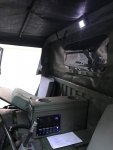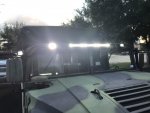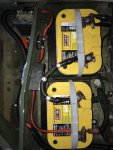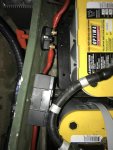Milcommoguy has some good info in there for you. just to add to it, the decision has to be made about the 12v convertor, whether you run it isolate or not. this meaning if the ground will be sharing the chassis of the truck or separate all together.
the shunt (like previously stated) has a resistance. as we have all heard before one time or another "the path of least resistance". this is where I have seen problems. all vehicles (cars, trucks, aircraft) use chassis grounds, aircraft use many voltages ac and dc with a common ground. touch on this in a minute.
some have used the first battery for a 12v source, (taps off of the jumper cable between the batteries whether the positive of the first battery or the negative of the second) which ends up draining that battery faster than the other, then the alternator senses the (24v) battery(both batteries in series) needs charging which it over charges the second battery, every few months you will have to change the one battery. so this set up is a bad choice. I prefer a battery equalizer, to maintain the batteries equally, the alternator puts out the 25+ volts and the equalizer makes sure both 12v battery stay equal and neither gets overcharged
(I use a cooper bussman 100A unit used in MRAPs)
. this also allows a 12v tap for accessories which is essentially using the first battery 12v (+) terminal without depleting this battery lower than the other.
Now back to the problem set ups with the "path of least resistance". when you use a convertor or choose to use the equalizer, I recommend the shared chassis ground(not isolated). all 12v accessories SHALL be grounded to chassis and NOT directly to the battery negative terminal. if 12v devices are grounded straight to the negative terminal, as bad as the corroded ground/chassis problems on these trucks, and the shunt being a resistor, this allows all components, 12v and 24v, to find the current path through the devices back to the battery ground terminal as they may be the "path of least resistance". when 24v devices find the path back to the batteries through a 12v device, bad things happen. this is definitely the case when a 12v CB or radio is used since the antennas require a ground plane of the vehicle through the coax to the device, which finds it way back straight to the ground terminal of the battery when connected directly (usually connected with a smaller gauge wire unable to support the current in the first place) . (I have heard of times when the minute the antenna is connected to the 12v device the ground wire of that device burns up immediately).
without going into it the sequence to disconnecting the batteries will be critical as well.
my set up has been very reliable, running stereos, CB, rough country lights and FLIR camera without issues, not to mention my battery health is great.










